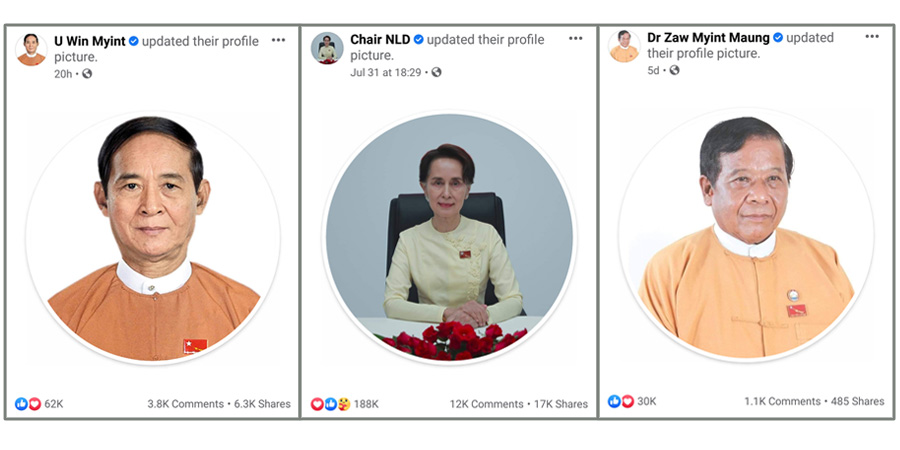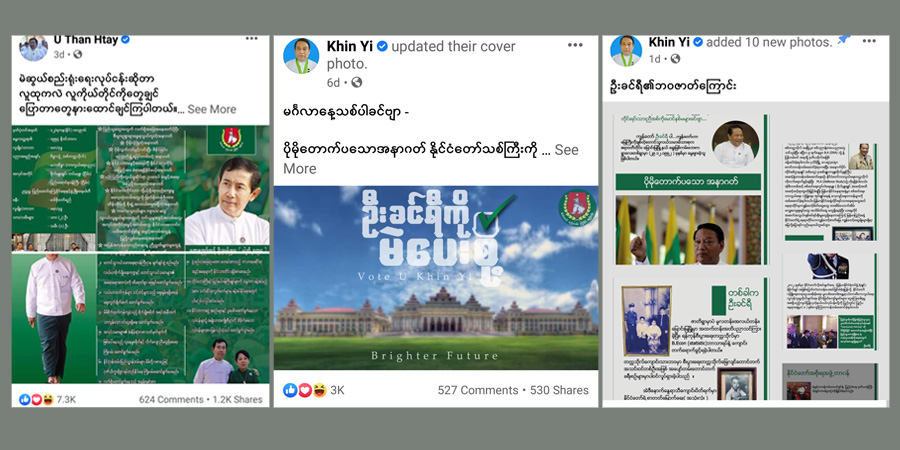YANGON—With most of Yangon under a stay-at-home order due to a rise in the spread of COVID-19, candidates in several tightly contested races in the November election have found traditional campaigning impossible.
Though the election campaign is officially under way, parties are barred from organizing rallies, campaigning in open spaces and buildings, or conducting door-to-door efforts in townships where stay-at-home orders are in effect.
Muted by the coronavirus, campaign managers in the country’s largest city have turned to Facebook, the most widely used social media platform in Myanmar, as an essential method of getting their election messages out.
Among the candidates taking that route is the 68-year-old President U Win Myint, who returned to Facebook for this campaign after a long absence from the platform.
He had not used his previous personal Facebook account since he took office.

U Win Myint, also vice chairman of the ruling National League for Democracy (NLD), is seeking re-election in his former constituency, Yangon Region’s Tamwe Township. That township is among those now under a pandemic stay-at-home order.
On his new Facebook page, which debuted on Thursday, President U Win Myint apologized for not being able to make close contact with constituents as he had in previous elections.
“I would like to ask your understanding on that,” he said, adding, “I urge you to vote for the NLD for our long-awaited democracy.”
NLD Central Executive Committee member Daw May Win Myint canceled her door-to-door campaign in the face of a stay-at-home order in Yangon’s Mayangone Township. She’s now planning to reach voters online as she re-contests in a tough competition there with NLD renegade and People’s Pioneer Party founder Daw Thet Thet Khine.
“We know we need to focus on online campaigning to win in the 2020 general election,” she said.
Other high-profile NLD figures are taking the same course of action.
NLD chairwoman and State Counselor Daw Aung San Suu Kyi and another vice chairman, Dr. Zaw Myint Maung, also Mandalay Region’s chief minister, have both recently turned to Facebook to engage with voters.
Through her new page, “Chair NLD”, Daw Aung San Suu Kyi has been recounting the party’s struggles for democracy and campaigning for the party.
Dr. Zaw Myint Maung, a 68-year-old former political prisoner, said that after being imprisoned for many years he isn’t very familiar with technology and had never opened a Facebook page.

“But now, I must do it. We have to rely on it when we can’t freely campaign in person during this era of COVID-19,” he wrote.
The main opposition and military-backed Union Solidarity and Development Party (USDP) is also taking an aggressive approach in the online sphere. The party has spent millions of kyats on boosting posts ahead of the election to reach Facebook followers as much as they can.
The party’s senior leaders including chairman U Than Htay, vice chairman U Khin Yi, and other parliamentary candidates are actively promoting the party’s policies and campaign promises through their personal pages and also the party’s page.
But the changed electoral campaigning method still has some candidates skeptical about whether online campaigning actually works.
NLD Yangon Region lawmaker U Wai Phyo Aung of Thaketa Township, which is also under a stay-at-home order, said he is concerned that his messages won’t reach his constituents.
“I am now trying to get my messages out through my Facebook account. But not all constituents are using social media platforms. That’s especially true of the older ones. Even if they do use social media, my messages can’t reach all of them,” he said.
In previous elections, he managed to get his message across to voters through door-to-door campaigns and rallies, he added.
“If voters don’t get enough information, they could find it hard to decide who to vote for,” he said.
Candidates in Rakhine, which has the second-largest number of COVID-19 cases after Yangon Region, are finding it harder to engage with voters.
“The restrictions are strict and this means we are not allowed to campaign. We can only operate online, but 2G internet stops us from doing anything,” the vice chairman of the Arakan Front Party, U Kyaw Zaw Oo, told The Irrawaddy.

In June 2019, the government cut off internet access in eight townships in northern Rakhine and Paletwa Township in Chin State, citing security concerns amid the fighting between Myanmar’s military and the Arakan Army (AA).
Mobile internet services resumed in those townships in early August, but residents say they still only have 2G service.
Meanwhile, the pandemic has also affected campaigning by those running in places with no stay-at-home orders.
In those areas, the Union Election Commission allows campaign gatherings of up to 50 people, while requiring attendees to practice social distancing and other preventive measures. Door-to-door campaigns are allowed but limited to 15 people in places with no stay-at-home orders.
U Ye Naing Aung of the People’s Party, which was formed by leaders of the 88 Generation Students group, said even in states and regions that have no stay-at-home orders, parties find it hard to campaign because of travel restrictions. And in some places, local residents afraid of the spread of the disease have blocked candidates from campaigning.
All of these complications have led some parties to call for postponing the election, citing concerns for citizens’ health as well as their difficulties in campaigning.
People’s Party chairman U Ko Ko Gyi said he is reluctant to solicit votes when people are in a state of panic and has said a delay of the election should be considered.
The election commission has said it will announce a decision on any election delay in October.
You may also like these stories:
Myanmar’s NLD Unveils Election Candidate Lineup With More Women, Muslims
Election 2020: The Week in Review
Myanmar Election Campaign Muted by COVID-19

















